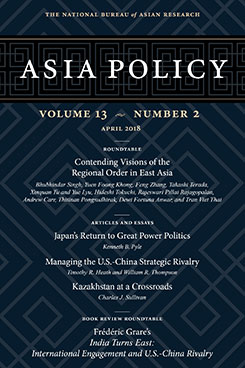Essay in Asia Policy 13.2 (April 2018)
Japan’s Return to Great Power Politics: Abe’s Restoration
This essay explains how Prime Minister Shinzo Abe is engineering a seismic shift in Japan’s foreign policy from a postwar position of dependence and subordination in the U.S.-led order to a proactive and independent role, which in the uncertain regional environment is likely to gain increasing popular support.
EXECUTIVE SUMMARY
MAIN ARGUMENT
After more than 70 years of subordination in the U.S.-led world order, Japan is pulling free from its self-binding constraints and restoring an activist foreign policy not seen since 1945. Coming to power with a surge of conservative nationalist support in the Liberal Democratic Party, Abe has engineered Japan’s return to great-power politics. He has achieved a historic reinterpretation of the constitution to permit collective self-defense, ended the ban on arms exports and other self-binding policies, and pressed for new offensive military capacity, all of which have made possible a much more cohesive and integrated U.S.-Japan alliance. Although Abe and the policy elite have had to override public opposition in returning Japan to this activist role, in such circumstances of transition in the international order, Japan has historically experienced rapid swings in geopolitical position. With the growing uncertainty of regional conditions, we should not be surprised if the pacifist identity that postwar generations have long embraced gives way and we see changes in the prolonged resistance of the Japanese public to revision of the constitution and to an activist and assertive foreign policy.
POLICY IMPLICATIONS
- Japan will closely weigh the reliability of U.S. assurances and the future direction of U.S. policy in Asia, especially as they relate to the management of the nuclear threat from North Korea and to Japanese interests vis-à-vis China.
- Japan’s immediate priority will be to strengthen its alignment with the U.S., but in the longer term it will increasingly move toward a more independent foreign policy that offers greater autonomy and room to adjust to its perception of the shifting regional balance of power.
-
Although Abe appears likely to remain in office until 2021, even should his term be shortened, his policies now have a momentum that will be very difficult to reverse. These policies are supported by all likely LDP candidates to succeed him, and the political opposition is weaker than at any time in the postwar period.
About Asia Policy
Asia Policy is a peer-reviewed scholarly journal presenting policy-relevant academic research on the Asia-Pacific that draws clear and concise conclusions useful to today’s policymakers. Asia Policy is published quarterly in January, April, July, and October and accepts submissions on a rolling basis. Learn more


